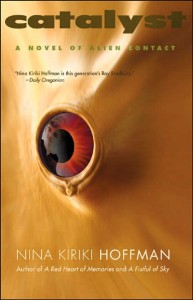 Sometime in the future, on the far-off, newly-colonized planet of Chuudoku, a teenage boy makes one of the most amazing discoveries possible. While fleeing from the predatorily-sexual advances of a cybernetically-augmented girl named Histly, Kaslin stumbles into an unexplored cave, which marks the beginning of a truly unusual First Contact situation. Trapped and transformed by the alien beings who dwell there in hiding, Kaslin and Histly are unwillingly linked in a struggle for survival and understanding. Can they learn to work with one another as they realize their new place in the deadly ecosystem of Chuudoku? And can they trust each other long enough to deal with the interference of well-meaning parental figures and greedy corporates who could destroy everything? Catalyst is a sensual story of tactile discovery, adolescent exploration, and alien communication, as told by Nina Kiriki Hoffman, who excels at merging the fantastic and the mundane.
Sometime in the future, on the far-off, newly-colonized planet of Chuudoku, a teenage boy makes one of the most amazing discoveries possible. While fleeing from the predatorily-sexual advances of a cybernetically-augmented girl named Histly, Kaslin stumbles into an unexplored cave, which marks the beginning of a truly unusual First Contact situation. Trapped and transformed by the alien beings who dwell there in hiding, Kaslin and Histly are unwillingly linked in a struggle for survival and understanding. Can they learn to work with one another as they realize their new place in the deadly ecosystem of Chuudoku? And can they trust each other long enough to deal with the interference of well-meaning parental figures and greedy corporates who could destroy everything? Catalyst is a sensual story of tactile discovery, adolescent exploration, and alien communication, as told by Nina Kiriki Hoffman, who excels at merging the fantastic and the mundane.
It’s honestly hard to know what to make of Catalyst. It’s a dramatic change from Hoffman’s usual urban fantasy fare, and a quantum leap forward (and sideways) in terms of tone, style, and language. Her people (especially Histly) are almost stranger than the aliens, while the setting is definitely alien and unfamiliar in feel. The way our protagonists interact with one another is enough to make a reader at least distantly uncomfortable. “Kaslin saw Histly and thought, yum. Histly saw Kaslin and thought, prey. After that first day, Kaslin saw Histly and thought, run.” And despite this bizarre dynamic set up at the beginning, they nevertheless join in a dysfunctional relationship that’s sure to raise a few eyebrows. It’s not that they hate each other, or that Histly is necessarily bad, but . . . dissecting the aspects of their interaction would take more time and space than I have.
And that, I’d say, is how one can approach just about all of Catalyst. For such a short book (less than 200 pages), it certainly packs a lot of meaning and subtext into its space. On the surface, it’s about a boy, a girl, and an alien race, and how they all learn to work together towards a greater understanding. Underneath the surface, the story teems with sexuality, texture, growth, change, and discovery. I’m absolutely sure that it’s pushing boundaries; I’m just not sure which ones, yet. Time will tell if this book will be singled out for its innovation, or rejected for being too strange. It certainly deserves some attention, and Hoffman’s to be saluted for venturing into such strange territory.
